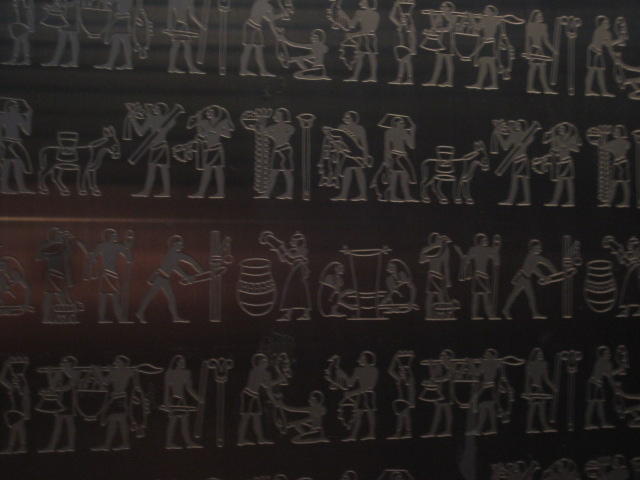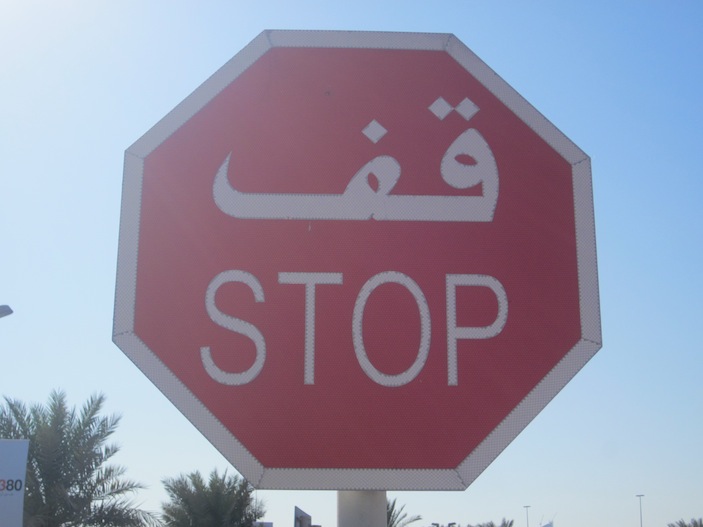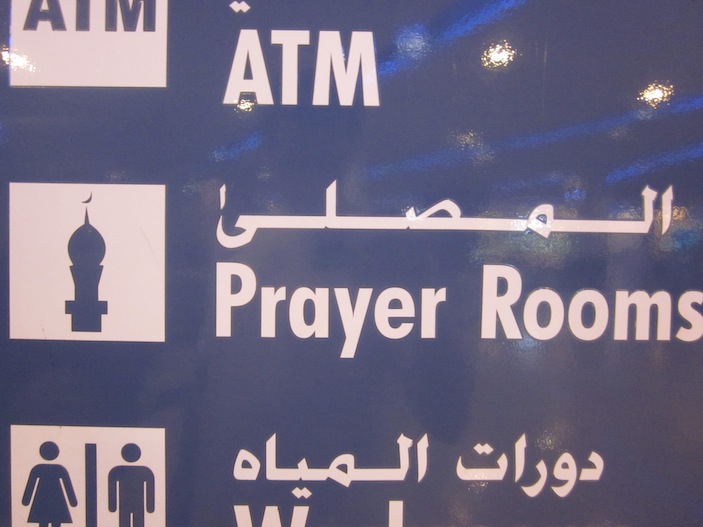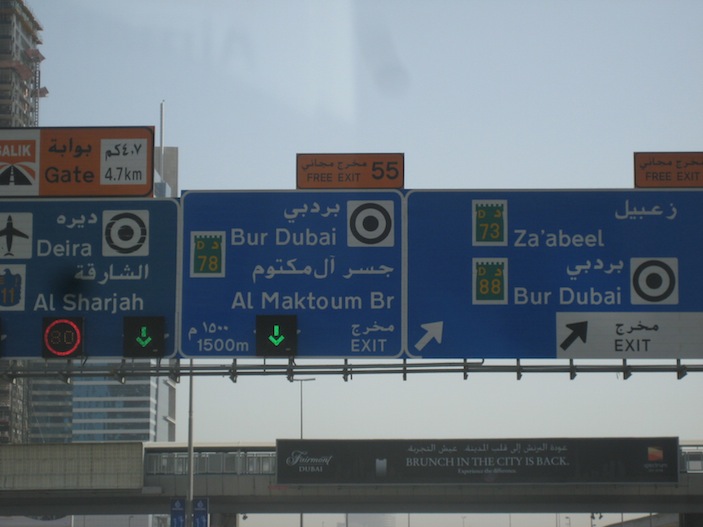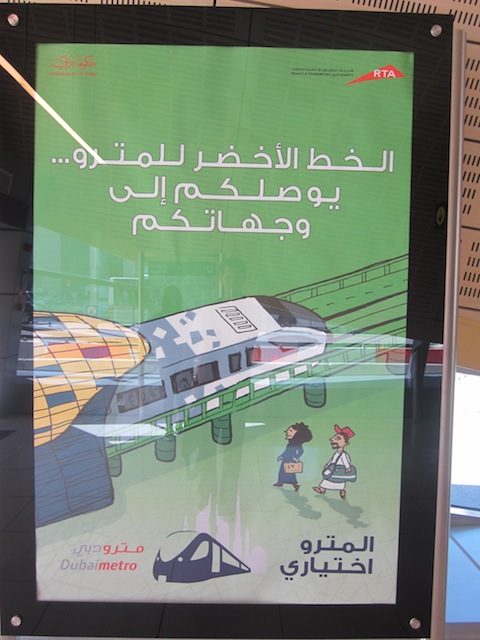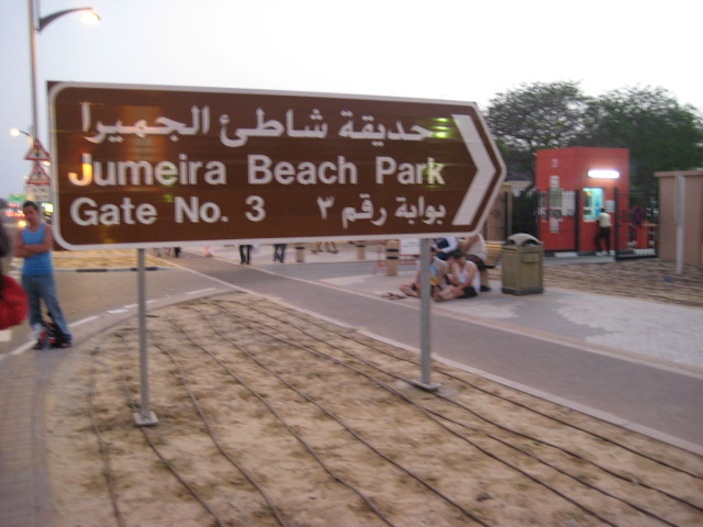Posts Tagged ‘Dubai’
IDdubai: Stop!
IDdubai: Prayer Room
IDdubai: Highway Signs
Human Rights Violation 1: Dubai House Maid Refuses to Drive
I was at the airport, waiting for boarding. I sat beside a young woman from the Philippines who was working as a house maid for an Emirati family in Dubai. She was on her way home—for good—because she refused her boss’ request to drive the family around Dubai. She did not have a license to do so, and did not feel safe doing so, but her boss didn’t care. He insisted, telling her not to worry about her (lack of) a license.
Knowing that she would be in serious trouble if caught driving without a license, the woman declined, to be greeted the following day with news that she was being taken back to the placement agency. Without anyone hearing her side of the story, she was sent directly to the airport, with a police escort, and her working visa was canceled. She was not paid her salary for the last month, not given any cash for things like food during her journey home, and wasn’t even given her luggage. Her boss also confiscated her cell phone, so as to wipe the record of any contacts the woman had in the Middle East. She was literally thrown out of Dubai with only the clothes on her back, all for refusing to drive without a license.
IDdubai: Loser’s Paradise!
I’m going to get into a lot of trouble with this post, but as the aim of Initial Descent is to offer a true glimpse into every culture, I can’t mince words. To put it simply, if you are a guy who has trouble with personality, you lack personal style, you’re a little on the chubby side without charm to compensate, or struggle with the opposite sex for any other reason, then Dubai is the place for you. The men who live in Dubai , though very diverse, all seem to have one thing in common: a girlfriend (or three) who would be way out of their league in their country of origin.
See, Dubai (along with counterparts Abu Dhabi, Doha and to some extent, virtually every other major Middle Eastern city for which this post would also apply) is a transitional place for most. It is a place people, mostly men, come from far and wide to make more money than they are probably worth, live a higher class lifestyle than they are probably accustomed to, flirt with more beautiful girls than they would be capable of meeting anywhere else, and ultimately return to their home countries a few years later—with more wealth and more notches on the bedpost. Oh, and in some cases a wife who, as referenced above, would otherwise be out of their league.
On the flip side, Dubai is full of women who come to follow dreams—specifically, in the tourism industry. While not many men do, there are women all over the world who dream of becoming a flight attendant, which in many cultures is considered to be among the more glamorous jobs, or working in an international hotel. Often, it is a dream that has lingered since childhood, influenced by visions of seeing Paris, New York and Rome—and getting paid for it. This is quite convenient for the men of Dubai (including those male flight attendants who seem to have figured the “fringe benefits” of the job out), as the city happens to be home to one of the largest and fastest-growing airlines in the world. And, having worked for one before, I’d be remiss to say that physical appearance is not one of the critical criteria that goes into the hiring decisions of most Middle Eastern airlines. On top of the thousands of girls Emirates employs, there are the countless hotel and other tourism staff, who have jobs that constitute the next best thing (to flying) for most.
While the simple concentration of attractive women here is the main factor working in men’s favor, the other major piece of the puzzle is that, inevitably, everyone who moves to Dubai for work—thousands of miles away from home for most—gets lonely. No matter where you are from, there is a culture shock, and not many comforts of home. And when loneliness sets in, and we don’t have our closest friends or family to cuddle up with, it’s human nature that we simply are drawn to another warm body to help distract us from our loneliness. Apply this homesickness to the beautiful women here, who often see the men that chase them around as “comfort zones” that happen to be in Dubai when they need someone in Dubai, and typical evaluation processes take a back seat. The women become attached emotionally; the men seem to be much more motivated by other factors, and usually the result isn’t pretty. But where else on earth do situations exist where men are actually treating women who are actually above their league as completely disposable? This is one of the more amazing elements of expatriate culture here. And yes, as with anything in life, there are exceptions to the general observations expressed in this post.
While there certainly are beautiful people of both genders in Dubai, much more of these happen to be of the female gender, many of whom are lonely, missing home, and looking for emotional support. Do the math, and it means that no matter what a guy may or may not have to offer, he more than likely has a model-looking girl on his arm.
IDdubai: Dubai Metro
Human Rights Violations in the Middle East: Prelude
Having spent a good deal of time in the Middle East—especially in Qatar—I’ve come to learn a lot of the good elements and bad elements of the culture here. There are many fascinating things, of which I hope this space will shed light upon many, but there are also some incredibly disturbing elements to the way people live here. Human rights violations are rampant, because people are not equal. I don’t bring these up to portray any Middle Eastern countries or cultures in a negative light, because most of what I’ve seen and heard are reflections of individuals and not the country or culture. But by shedding more light on them, I hope they can eventually be discovered and eliminated.
In most cases, the problems that exist are based on class and racial differences. The skyscrapers that you see here were all built by day laborers from India, Nepal and surrounding areas. The service industries, like hotels and restaurants, are being run on the backs of young men and women from Thailand and the Philippines. And the majority of children here are not raised by their own parents, but by nannies that are brought in from Southeast Asia specifically for that purpose. While this diversity is in and of itself a good thing, unfortunately these people are not accepted as anything more than the servants they are to the rich locals, and are treated as such.
With this prelude, stay tuned to this space for a series of stories of things that will hopefully not occur here for too much longer.
IDdubai: Jumeirah Beach Park
IDmanila: Use Your Natural Beauty for Inspiration, Not Someone Else’s Artificial Reality!
If you’ve ever been to the newly sprung up, modern cities of the Middle East, it is no secret that Filipinos make up a huge part of today’s culture there. It seems that every hotel in Abu Dhabi, Doha or Dubai are staffed with Filipinos, working diligently and bringing their natural hospitality abroad. It is a win-win for everyone—the hotels get naturally hard-working, hospitable workers who speak English at a native level, while the staff have opportunities to earn salaries that they wouldn’t back home. Filipinos working in other industries flock to the Middle East as well—oil and gas being a major one.
Given the influx of Filipinos in that part of the world, it is not surprising that some aspects of the modern-day Middle Eastern culture would make their way to the Philippines as well—airplanes fly in both directions, after all. But on a recent visit to Manila, I was saddened by one particular element that seemed to be springing up—the idea of smoke-and-mirrors culture.
While the Middle East has a long and storied history as a trading post, today much of it has been reinvented into a playground for the rich. Oil money flows freely, and developers race to build the tallest, shiniest, sleekest, fanciest office and residential spaces they can dream up. In trying to attract buyers and wow the rich, there is little consideration given to historical context or the surrounding environment. And while there is some history there—there is not much else. Dubai was built on a sand dune, just the way Las Vegas was 60 years earlier in the Western United States.
The Philippines, however, is not the Middle East. It is full of a rich cultural heritage that is preserved today, a spiritual and energetic people who carry their flag proudly. Physically, it is a lush, green, fertile land that some of the world’s most exotic and unique species call home. There is no need to create something artifical, tall, shiny, sleep and fancy here—because the natural beauty is strong to begin with.
And yet, one of the developments I saw being sold was called “The Venice Residences”—something seemingly straight out of Dubai. Little homes built on the banks of a fake waterway, complete with verandas and gondoliers. And in my estimation, something so tackily forced in hopes of raising the real estate price tag.
I sincerely hope the Philippines—with all of its spirit and pride and natural beauty—will not fall into the trap of trying to copy the artificial culture of Dubai or Las Vegas, which don’t have the natural gifts to work with that should be appreciated here.
.jpg)
